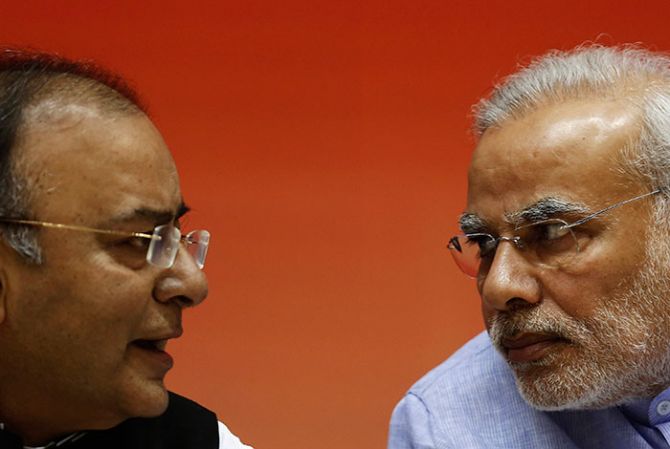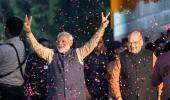With his multifaceted experience and acumen, Jaitley was the man for the Modi government in its first term from 2014 to 2019.
If one were to go by the degree of clout, Jaitley was the undoubted No. 2 in the Modi government.

Health seems to have paused, if not ended, a superb four-decade-long political career of articulate, suave and super strategist Arun Jaitley -- regarded by some as Narendra Modi's original 'Chanakya', his chief trouble-shooter since 2002 when the Gujarat riots hung over the then chief minister like a dark cloud.
A day before the Modi 2.0 government is to be sworn in, Jaitley, 66, on Wednesday cited health issues to ask the prime minister -- who has aptly described him as 'a precious diamond' -- to let him stay out of the Cabinet.
Knowing well how to work the levers of power, he was Modi's go-to man in New Delhi since the late 1990s and over the years graduated from being the legal brain warding-off court trouble in the aftermath of the 2002 riots to being his chief swordsman, input provider and sounding board.
With his multifaceted experience and acumen, Jaitley was the man for the Modi government in its first term from 2014 to 2019.
Be it portraying of the government's achievements or defending controversial policies or launching a fierce attack on the Congress or framing the 2019 election as one between the quest for stability or for chaos, few could have been more effective.
To the world and the nation, he explained the global context of rising fuel prices, articulated a complex Rafale fighter jet deal in simple terms, steered through Parliament major economic legislation such as the nationwide Goods and Services Tax (GST) -- which had languished for nearly two decades.
When the government was being criticised for interfering in the judiciary, it was the doughty lawyer-turned-politician who defended its record and commitment to democratic values.
He was also the man who explained government position when a bill to ban the Muslim instant divorce practice known as 'triple talaq' was brought.
From being the Baharatiya Janata Party government's key political strategist to managing what is arguably the most important, sensitive portfolio -- finance -- Jaitley wore many hats, while pursuing his more material interests such as collecting expensive pens, watches and luxury cars.
A moderate, Jaitley has friends across the political spectrum, and is one of India's most articulate and influential leaders who brought civility and reason -- irrespective of whether one agrees with him or not -- to public discourse.
If one were to go by the degree of clout, Jaitley was the undoubted No. 2 in the Modi government.
Several ministers such as Nirmala Sitharaman, Piyush Goyal and Dharmendra Pradhan are believed to have been his proteges.
A whole host of other appointments, including those of most senior law officers, could be ascribed to him. All party spokespersons flocked to him for advice.
Like many other ministers in the Modi 1.0 government, he did not have a political base of his own and was inducted purely because of his calibre and the trust he commanded at the top.
While Environment Minister Prakash Javadekar once called him a 'super strategist', Modi described him as a 'precious diamond' at an election rally in Amritsar from where Jaitley contested -- and lost -- his first election ever in 2014.
Still, he retained his fondness for 'Amritsari choley' and 'kulcha'.
As the quintessential insider in the capital's political arena, he was darling of media who was so open that he was sometimes accused of being indiscreet and too candid for his own good.
Modi and Jaitley go back a long way. When Modi, a Rashtriya Swayamsevak Sangh 'pracharak' , was appointed a BJP general secretary in the late 1990s in Delhi, he stayed in an annexe of Jaitley's official bungalow on 9 Ashoka Road.
At the time, Jaitley was a minister in the Atal Bihari Vajpayee government.
He is believed to have been part of the move to oust then Gujarat Chief Minister Keshubhai Patel and install Modi.
He backed Modi as chief minister during the outcry over the 2002 riots in Gujarat when support from other BJP leaders in Delhi was not so unwavering.
Jaitley, who got first elected to Rajya Sabha in 2002 from Gujarat, had an eye to spot long-term prospects and was said to be behind replacing Uma Bharti with Shivraj Singh Chouhan as Madhya Pradesh chief minister in 2004.
Son of a successful lawyer who had migrated from Lahore after partition, Jaitley studied law and became president of the Delhi University Students' Union when Indira Gandhi declared Emergency.
He spent 19 months in prison for organising a massive protest at the university campus.
After the Emergency was lifted, he began practising law and in 1980 challenged the move by Jagmohan, then Lieutenant Governor of Delhi, to demolish the Indian Express building, which brought him in close contact with Ramnath Goenka, Arun Shourie and Fali Nariman.
This association brought him to the notice of V P Singh, who upon becoming the Prime Minister appointed Jaitley as additional solicitor general, one of the youngest ever to hold the post.
When the National Democratic Alliance first came to power in 1999, Jaitley was appointed minister by Vajpayee and over the years handled law, information & broadcasting, disinvestment, shipping, and commerce and industry portfolios.
In 2006, he became the leader of the opposition in the Rajya Sabha and earned the respect of many Congressmen because of his clarity, quick thinking, and phenomenal memory.
When Modi first stormed to power in 2014, he was made the minister for finance and corporate affairs and was also given additional charge of ministries of defence and information and broadcasting for short periods.
But his health forced him to take a three-month break last year to undergo a kidney transplant and this year forced him to travel to the United States for treatment, depriving him of the opportunity to present sixth and final budget of the Modi government's first term.










